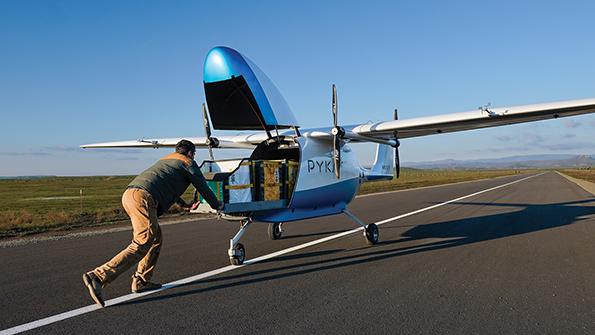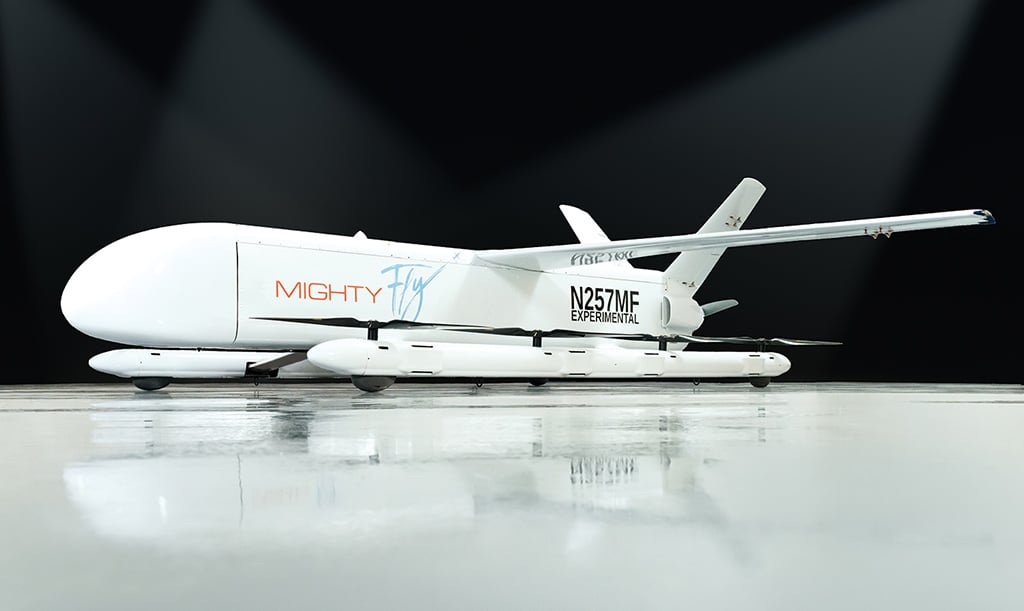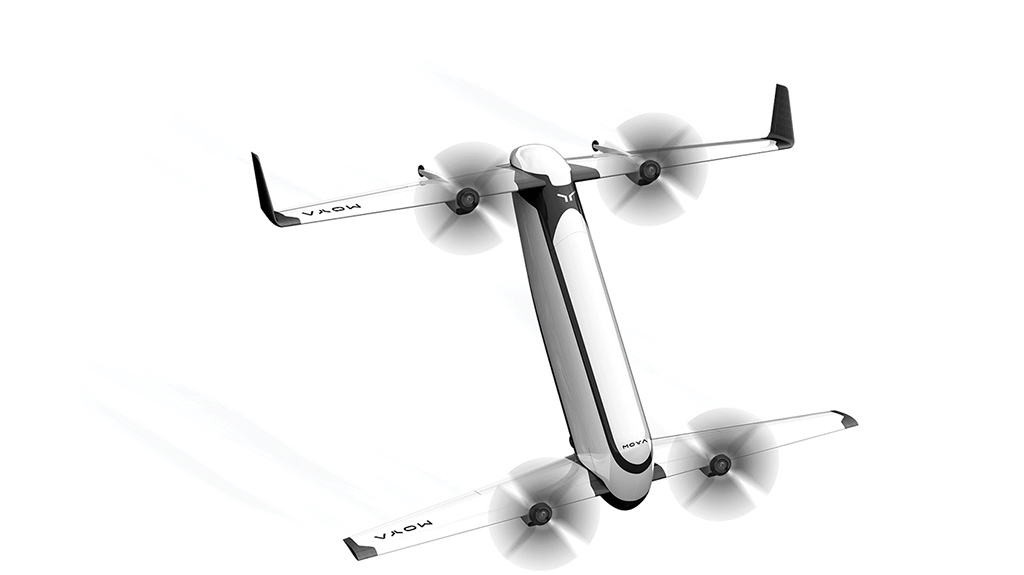From U.S. To Brazil, The Market For Large Express-Logistics UAVs Is Taking Off

Pyka’s Pelican Cargo has a larger fuselage than the Spray and four electric propellers rather than three.
Large uncrewed cargo aircraft soon could be plying drone corridors over the southwest UK under an agreement between U.S. startup Pyka and operator Skyports Drone Services. The deal is part of a trend to accelerate the deployment of larger drones by beginning in regions where regulators have more flexibility to approve operations.
Pyka is one of a growing number of startups developing uncrewed cargo aircraft with substantially larger payloads and longer ranges than the small drones now being used to deliver medicines and other supplies. Skyports is a launch customer for Pyka’s Pelican Cargo, an autonomous electric aircraft with a 400-lb. payload and range up to 200 mi.
- Pyka’s Pelican Cargo to fly in the UK
- MightyFly’s Cento eVTOL enters testing
- Moya Aero eyes agricultural market
The 1,320-lb.-gross-weight Cargo, which features a 38-ft. wingspan, made its first flight on Dec. 22 at Merced, California. The aircraft is a derivative of the Pelican Spray, an autonomous aerial-application electric aircraft that is spraying crops in Brazil, Costa Rica and Honduras.
Pyka joins startups such as Elroy Air and MightyFly in the U.S. and drone airline Dronamics in Europe, which see growing demand for larger uncrewed cargo aircraft to support e-commerce, provide humanitarian relief, improve health care in rural communities and connect remote areas.
FAA regulations have slowed the deployment of small drone deliveries in the U.S. and led companies such as Zipline to begin operations in Africa, where regulators have been more flexible in their approach. Pyka is taking a similar offshore-first approach to fielding its Pelican family.
UK-based drone operator Skyports plans to begin flying the Cargo early in the second quarter in Cornwall, England. This will include flights under Open Skies Cornwall, a project that has received £2.4 million ($2.9 million) in UK government funding under the country’s Future Flight Challenge. A second, undisclosed UK trials program is planned.
Open Skies Cornwall is building landing infrastructure, uncrewed traffic management sensor networks and establishing “Skyhighways”—drone flying corridors—in low-altitude airspace to support medical and commodity deliveries for partners including the UK’s National Health Service, Royal Mail and Cornwall Council.
Pyka began flying the Pelican Spray in Latin America because it was easier to gain approval there for operations. The company has applied to the FAA for a Section 44807 exemption to Part 107 rules for drones, which would allow it to spray crops in the U.S. “We anticipate that in the next few months,” says Volker Fabian, Pyka chief commercial officer.
The startup plans to apply for a similar exemption for cargo operations in the U.S. but is beginning in the UK, where Skyports expects to fly the aircraft under Specific Category rules for drones. These permit flights with heavier uncrewed aircraft when they have been granted an operational authorization from the regulator.
“We raised an application [with the UK Civil Aviation Authority] in October and anticipate a SORA-based [Specific Operations Risk Assessment] approval within the next six weeks,” Fabian says.
“We’ve been focused on operations with smaller, high-value payloads,” says Alex Brown, director of Skyports Drone Services. “The introduction of the Pelican Cargo brings new capabilities and means we can now fly significant volumes of cargo long distances, connecting communities in remote areas.
“Importantly, we are doing this now—this isn’t future-gazing; it’s a ready-to-go service,” he adds. Pyka plans to work closely with Skyports on all cargo applications. This includes a launch operator in the Caribbean, where the regulator intends to base its approval on the UK process, Fabian says.
The two Pelican models are 80% common, but the Cargo has a larger fuselage and bigger battery and is designed to fly 150 mi. with its maximum 400-lb. payload. The Cargo has 66 ft.3 of cargo volume with an upward-hinged nose and sliding cargo tray to facilitate loading and unloading.

Credit: MightyFly
MightyFly, meanwhile, began hover tests of its Cento hybrid-electric vertical-takeoff-and-landing (eVTOL) uncrewed cargo aircraft in December. The aircraft is designed for end-to-end delivery, from factory to warehouse or fulfillment center to retail store, with a payload capacity of 100 lb. and range up to 600 mi. Cargo is loaded and unloaded autonomously via conveyor belt to minimize human handling.
“Traditional express shipping services involving cargo aircraft rely heavily on ground transportation to connect the first, middle and last miles and to move goods to and from an airport,” says MightyFly CEO Manal Habib. The last mile is the most expensive and least efficient part of express delivery, she says, adding that the Cento “does not require an airport or ground transportation infrastructure, as it can transport goods from source to destination, generating time and cost savings.”
Compared with Elroy Air’s hybrid-electric Chaparral, which is designed to fly 300 lb. of cargo 300 mi., the Cento has a relatively light payload but a long range. “Many express delivery providers travel with the vehicle’s cargo capacity partially empty. This generates inefficiencies and high costs,” Habib says. “With 600 mi. of range and 100 lb. of cargo, MightyFly can provide express delivery services while operating with the aircraft fully loaded most of the time.”

Credit: Moya Aero
In Brazil, startup Moya Aero is developing an uncrewed eVTOL aimed initially at crop spraying and cargo transport on large farms. The all-electric aircraft is designed to carry a 440-lb. payload 70 mi. Moya is building an 18-ft.-span demonstrator that it plans to fly in September. The production eVTOL will have a 23-ft. span and weigh 1,500 lb.
Based near Embraer in Sao Jose dos Campos, Moya was founded in 2020 as a spinoff from engineering services company ACS Aviation. The startup already has secured seed funding and in January received a $2 million grant from Brazilian government technology funding agency Finep, says co-founder and CEO Alexandre Zaramela.
Designed to be simple, the aircraft has tandem wings fixed at an angle to the fuselage so it takes off vertically and then tilts its body to transition to forward flight. The four fixed-pitch propellers provide propulsion in both vertical and forward flight. The batteries can be charged or swapped.
After the agricultural market, Moya plans to target offshore operators, a major business in Brazil, as well as cargo transport to remote communities in regions such as the Amazon. There are no rules for Class 1 (above 330 lb.) UAVs in Brazil, so Moya is working with regulator ANAC to establish the certifications. The startup is looking for certification as well as venture funding in the U.S. and Europe, and it also has established an office in the U.S.

